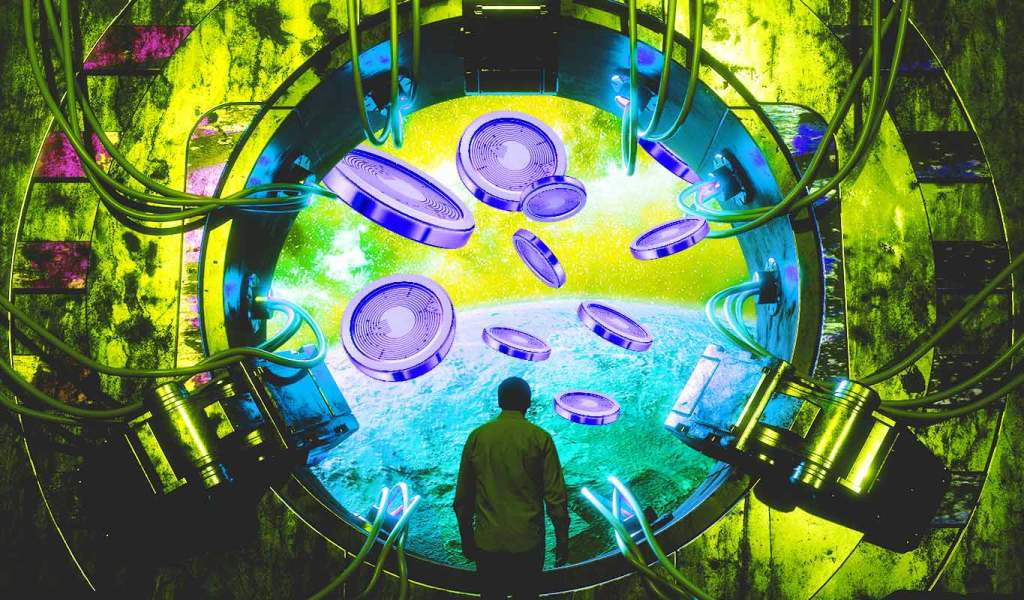
Blockchain gaming tokenomics may have got a bad wrap last cycle, but GameFi execs say it’s not going away anytime soon as it’s one of the key ways to build a player base.
Despite lingering resistance from some gamers over “tokenomics,” gaming studios will most likely continue to use airdrops and other incentives to attract players, according to industry executives.
“It’s a very easy way to get market share, said Kieran Warwick, founder of gaming studio Illuvium in an interview with Cointelegraph.
However, games that fail to deliver on the fun, or gameplay aspect, are still doomed to fail, said Warwick.

During the last bull run, VC firms were more concerned about missing out on the hype, but they’re taking a much more measured approach this time.
Venture capital firms haphazardly piled into blockchain gaming projects during the last bull run but are taking a much more mature and sustainable approach this time, according to industry executives.
“[It was] insane,” Shi Khai Wei, founder of cryptocurrency-focused VC firm LongHash Ventures, told Cointelegraph, adding that some GameFi projects were receiving up to $100 million with only a few team members and some lofty promises.
Keiran Warwick, founder of GameFi studio Illuvium, who recently raised $12 million in VC funding, said he saw the same thing, with much of the investor fervor then driven by a fear of missing out (FOMO).

A closely followed trader says that a low-cap altcoin that started August on a high note is likely due for another round of rallies. Pseudonymous analyst The Flow Horse, formerly known as Cantering Clark, tells his 180,900 X followers that Yield Guild Games (YGG) could be gearing up for a big bounce. YGG, the native […]
The post Trader Predicts Nearly 60% Rally for Altcoin That Exploded This Month but Warns No Crypto Bull Market in Sight appeared first on The Daily Hodl.

An Ethereum (ETH) gaming altcoin exploded in price over the past week before retracing after a series of whales sent their stacks to crypto exchanges. Yield Guild Games (YGG), a blockchain-based play-to-earn gaming decentralized autonomous organization (DAO), saw its native token rally from trading at around $0.18 one week ago to a high of nearly […]
The post Big Players Gear Up To Unload Bags of Ethereum Gaming Altcoin That Rose 316% in Less Than a Week: On-Chain Data appeared first on The Daily Hodl.

YGG’s head of ecosystem development described subDAOs as “sort of its own economy, that has its own treasury and its own token” with its own characteristics depending on the country it's located in.
The blockchain-based gaming industry will need to look at localized strategies to attract Web3 gamers, says decentralized gaming guild Yield Guild Games (YGG).
Speaking with Cointelegraph at the 2022 Tokyo Games Show last week, Andy Chou, YGG’s head of ecosystem development, and Brian Lu, partner of Taiwan-based VC firm Infinity Ventures Crypto (IVC) gave a rundown of YGG’s plans moving forward, including how it is using its subDAOs.
YGG was initially launched in the Philippines in late 2020, but following an early-stage investment from IVC, the duo teamed up to expand YGG across the globe via subDAOs, initially starting in Southeast Asia.
As per YGG terminology, SubDAOs act as a “specialized, miniature economy that interacts with a larger, all-inclusive economy” under the YGG umbrella. They were introduced into the YGG ecosystem around July last year.
While many may associate YGG with its Philippines-based outfit that offers scholarship programs for play-to-earn (P2E) games such as Axie Infinity, the guild has gradually been expanding to other countries and regions such as India, Japan, Brazil, and Latin America though the use of subDAOs.
Chou described the idea of a YGG subDAO as “sort of its own economy, that has its own treasury and its own token” adding that each subDAO has a different setup and business partnerships depending on what country it is located in.
For example, Chou noted that while the concept of YGG scholarships — in which players people are are loaned NFT assets so that they can earn from games — has been a key driver for web3 gaming adoption in the Philippines, he doesn’t see this necessarily being relevant in the context of YGG Japan.
Instead, Chou suggested that tapping the long list of beloved Japanese “gaming IP” is the best way to attract people to Web3 games in Japan, while Lu confirmed that they are focused on “helping market Japanese games” as opposed to offering scholarships there, stating:
“Japanese IPs are something that everybody covets. [...] You have [companies like] Sega, Bandai Namco, all those gaming companies want to pivot and come into Web3."
Questioned on what Chou thinks is currently holding back Web3 gaming from mainstream adoption, he outlined that the onboarding process is still a complicated process for new users, something that their YGG Japan subDAO has recently been moving to address.
On Sept. 16, YGG Japan announced a partnership with IVC and web3 tech firm KryptoGO to develop a wallet specifically targeted at blockchain gamers. While details were sparse in the announcement, the trio aim to create a simplified interface for users to access blockchain games and host all their assets in one place.
Chou said other barriers included a lack of knowledge about what NFTs represent, as many critics still argue that the assets are worthless as they can just right-click and save the NFTs associated artwork.
“That whole process of just onboarding, once that gets more smooth, will help bring in more folks. I think even at the education [level], just explaining what it means to actually own a digital item. As opposed to being like 'oh, I can just copy this and get it.'”
“Having that digital ownership of those digital goods. It's something that just hasn't really been explored. But as the world gets more and more digital, you know, I feel like that's where a lot of things are moving,” he added.
Related: Bandai Namco, SEGA among gaming giants eyeing blockchain gaming
YGG was co-founded in 2020 by Beryl Li, blockchain dev @OwlOfMoistness and Gabby Dizon, with the the latter also being one of the founding members of Oasys, which is tentatively set to launch a gaming-focused blockchain later this year.
As of June, YGG’s network across the globe had more than 30,000 scholars. For loaning out their NFTs, YGG offers 70% of in-game earnings to the players, 20% to scholarship managers and the remaining 10% goes to the specific subDAO.

Contrary to the obvious explanation, this massive whale wallet is not owned by Axie Infinity or the company behind it, Sky Mavis.
For nearly a year now, a mysterious Axie Infinity wallet has been quietly amassing billions of Smooth Love Potion (SLP), the in-game cryptocurrency powering one of the industry’s most popular play-to-earn (P2E) crypto games.
Today, the anonymous whale wallet now holds a little over 22 billion SLP — more than 50% the total circulating supply of the token.
The problem? No one knows who it belongs to and what their intentions are.
The wallet in question was brought to Cointelegraph’s attention by Axie Infinity player and tech co-founder Michael Benko, who first caught wind of this mysterious wallet on Aug. 25.
Benko told Cointelegraph he became concerned about the wallet given the amount of SLP it had gathered in a relatively short amount of time, which could potentially wreak havoc on the game’s ecosystem.
“The significance of a wallet holding so much SLP, if it's an individual person, gives that person a huge amount of control over an economy, especially in an economy where it’s so hard to mint a token.”
Launched in 2021, Axie Infinity is a blockchain-based game in which players purchase NFTs of cartoon creatures which they breed and fight against other players in turn-based gameplay.
SLP is earned by players for completing daily quests, battling other players in the “Arena” mode or playing against AI in the “Adventure” mode. The SLP can be used for breeding Axies, crafting in-game runes and charms (power-ups), and can be sold on exchanges.
Benko noted that as per the latest season update, an average Axie Infinity player can generate between 10 to 70 SLP per day, depending on how good they are at the game.
“So it is a concern, if someone's sitting there with 22 billion SLP [...] they could really keep the price flat or keep the price down when it actually should, by natural market conditions, be going up.”
The cryptocurrency is currently priced at $0.004, down 99% from an all time high of $0.40 on Jul. 13, 2021, according to Coingecko.
Theories explaining the existence of the wallet have only led to dead-ends so far.
Benko initially theorized that the wallet was “some system Axie Infinity had to automatically distribute SLP to players who earned it.”
However, Sky Mavis co-founder and COO Aleksander Larson told Cointelegraph that neither Sky Mavis nor Axie Infinity hold any of the game’s cryptocurrency, stating:
“All tokens in existence have been created by players.”
Yield Guild Games co-founder Gabby Dizon — one of the major DAOs for players of Axie — said YGG didn’t own the wallet and suggested it could be a wallet used by an exchange to hold liquidity.
Related: Axie Infinity looking to ‘double-down’ on Korean market: KBW
“Don't think this is ours as we typically use all of our minted SLP for breeding,” said Dizon, adding that “the most likely explanation is that an exchange is holding it for their liquidity.”
Benko however noted that while many SLP transactions saw Binance as a sender or recipient for many transactions, upon looking at the transactions, he doesn’t believe that it is a wallet owned by the crypto exchange.
“Binance seems to have an official wallet [already] and this doesn't seem to be that wallet.”
Cointelegraph reached out to Binance for comment but has not received a response at the time of writing.
If you have any theories on who is behind the wallet contact felixng at cointelegraph.com

The largest whales on the Ethereum (ETH) network are jumping into a series of different altcoins associated with the metaverse sector over the last seven days, according to blockchain tracking service WhaleStats. As per WhaleStats’ on-chain data, virtual world The Sandbox (SAND) is currently by far the most purchased metaverse altcoin among Ethereum’s top 5,000 […]
The post Biggest Ethereum Whales Scoop up The Sandbox, Apecoin, Decentraland and Three More Metaverse Tokens: WhaleStats appeared first on The Daily Hodl.

The passing of an investment proposal brought into question a legal agreement between the organizations and the Merit Circle DAO agreed to a counterproposal that would ensure a settlement.
A potential legal battle has been prevented between the Merit Circle decentralized autonomous organization’s (DAO) backing company Merit Circle Ltd and Yield Guild Games (YGG) after the organizations reached a deal after the DAO originally voted to remove YGG.
Merit Circle Ltd is a company that created the Merit Circle DAO to help gamers interested in play-to-earn games by lending items from its treasury to be used for gameplay as well as delivering educational content.
Originally, the DAO passed a proposal that would cancel YGG’s Simple Agreement for Future Tokens (SAFT) and refund it only with its initial 175,000 USD Coin (USDC) seed contribution.
Despite some acrimony, YGG has still walked away with ten times its initial investment.
The improvement proposal, called MIP-13, passed on May 28 alleging YGG provided a “lack of value” to the DAO and the guild was actually a “top competitor” to Merit Circle, not a partner. The proposal would “trim the fat” from the DAO to “ensure only those who want to see Merit Circle succeed remain”.
But, the passing of MIP-13 may not have honored a legal agreement between Merit Circle and YGG which would see YGG receive tokens in return for its financial contribution toward Merit Circle.
YGG said in response to the proposal that it wasn’t clear what legal authority the DAO has to nullify a contract Merit Circle Ltd signed on its behalf and that no condition existed for Merit Circle to cancel the contract “regardless of how this has been presented by them to the community.”
Merit Circle agreed upon a counterproposal with YGG to honor the legal agreement. It was posted and unanimously passed on June 9 and the DAO bought out YGG’s fund allocation.
This netted the guild 1,750,000 USDC, a ten times return on its original seed investment.
On June 14, both Merit Circle and YGG stated they were amicable on the outcome, saying the solution “still satisfies the will of the Merit Circle community, but was also acceptable to YGG.”
They added that as the original proposal clashed with the prior legal agreement Merit Circle made with YGG, it likely would have led to legal action.
Both parties stated they recognized the “danger a precedent like this could set for the Merit Circle DAO and the industry as a whole if agreements are not upheld and investors are not respected.”
Related: Number of DAOs increases 8x along with spike in votes and proposals
“Whilst the legal question is one that could probably be argued at length,” the organizations said, “both parties agreed it was better to settle.”
“This would spare both parties from a costly, time-consuming, legal process with uncertain outcomes. None of the parties had to settle, but both parties chose the constructive path to help Merit Circle move forward.”
Merit Circle and YGG said whilst the solution terminates the formal relationship between them, each will continue to “give their all to growing the blockchain gaming ecosystem” and that Merit Circle would still have “continued support” from YGG.

Yield Guild Games has had a very strong start to 2022 despite crypto markets falling steadily throughout the first three months of the year.
Yield Guild Games (YGG) has released its Community Update for Q1 2022, revealing that total scholarships rose 39% overall as the guild continues to farm copious amounts of the Axie breeding Smooth Love Potion (SLP) token.
The Community Report shows that the month-on-month growth of scholarships in YGG has been strong despite a downturn in the market. January saw 50.13% growth, February saw a 28.8% increase, while March had 41.93% growth fueled by new partnerships and the rollout of SubDAOs. By the end of March, the guild had 29,458 scholarships, mostly from Axie Infinity.
SubDAOs are decentralized autonomous organizations (DAO) specialized for particular geographic regions. There are currently three SubDAOs in Southeast Asia, India, and Latin America.
YGG is a gaming guild that pools together gamers from across the play-to-earn (P2E) space in order to generate revenue for the community and teach newcomers how to be successful through a scholarship program. The guild generates revenue from staked YGG tokens and scholarships. Nonfungible token (NFT) game Axie Infinity accounts for the majority of scholarships across all of YGG’s 12 partner games.
To date, the guild has farmed 195 million SLP worth about $1.1 million at the time of writing, according to CoinGecko. SLP is a token used to breed Axies, which is one of the major activities for scholars. The report states that with 25.86 million SLP farmed, February was the most profitable month since it began last April.
Prices across the crypto markets have been down through 2022, as illustrated by the 44% drop in market cap since Jan. 1. However, blockchain gamers have not put down their controllers. Data from decentralized application (DApp) tracker DappRadar shows that user numbers have remained fairly stable at about 1.1 million daily gamers since the beginning of the year.
Related: Web3, NFTs, Metaverse: The tools for a truly decentralized future
Yield Guild Games spent $2.5 million on new partnerships through Q1. 63% of those funds went to P2E game partnerships, while 23% went to guild partnerships. The remaining 14% went to infrastructure and platform support to expand the P2E ecosystem.
The future of NFT gaming looks promising based on the growth rate of YGG and the amount of funding going toward new game development. Since April 25, nearly $400 million has gone to fund early-stage NFT games, according to data from investment tracker Airtable.
YGG is the native token for Yield Guild Games. It is down 12.3% over the past 24 hours and trading at $0.72, according to CoinGecko. Additionally, YGG is down 93.6% from its Nov. 20 all-time high.

The relief fund has been used to purchase essential goods like medicines, power generators, and canned food for affected communities in the Philippines.
Yield Guild Games (YGG) has raised $1.45 million to support people affected by December 16's Typhoon Odette in the Philippines, with nearly $1 million already dispersed to people in need.
The funding was used to purchase essential goods like medicines, power generators, and canned food, which were turned over to the Philippine Army and Navy and non-profits to distribute among affected communities.
There is still about $458,000 worth of crypto and tokens that have been donated to the relief fund but they have yet to be converted to fiat currency for deployment, according to a representative from YGG.
Our Transparency Report for Typhoon #OdettePH relief efforts is up! @yieldguild raised $1.45M and has so far disbursed a total of $992K to date. Meanwhile, our direct financial assistance program has helped 3K+ households begin to rebuild ❤️ https://t.co/GMdu8OjfxP
— YGGPilipinas (@YGGPilipinas) January 31, 2022
The Filipino division of the play-to-earn gaming guild “YGG Pilipinas” announced the relief operation a day after Typhoon Odette hit the country, quickly raising $110,000 in a number of crypto tokens including SLP, AXS, ETH, WETH, and USDC by the end of the day.
Getting close to the 6,000,000 peso ($110K) mark in crypto donations. We'll continue to raise funds all throughout the weekend while we find and assign key community leaders in each affected city. #OdettePH https://t.co/HgKjzw3h7v
— YGGPilipinas (@YGGPilipinas) December 17, 2021
YGG Pilipinas Country Manager Luis Buenaventura led the initiative. He explained to Cointelegraph that the Philippines represents the largest portion of the YGG community, so Odette was close to their hearts.
“We’re Filipino-led; many of the senior staff reside here in the Philippines and indeed the largest portion of the global play-to-earn community is based here, which is why so many of the play-to-earn projects came out to contribute to the cause when they saw the extent of the typhoon damage.”
“Our community is as important to us as our core team, and many of them were either driven from their homes or have been living without running water or power for a month now,” he said, adding that many staff members were living in areas badly affected by the typhoon.
Aside from funds collected by the YGG community, a number of others in the broader Web3 community also got involved. Co-founder of NFT play-to-earn game Axie Infinity Jeffrey “Jihoz” Zirlin donated 1,000 AXS ($55,400) to the relief fund on Christmas day. He said:
“As we work together to help our brothers and sisters in the Philippines recover and rebuild, we remember that this is what our community is about."
YGG co-founder, Gabby Dizon, said that the relief effort showed the power and unity of the Web3 gaming community. “This is our testimony that we are more than just a community of gamers,” he said.
Meanwhile, players of the play-to-earn game DeFi Kingdoms (DFK) also voted to donate a total of $500,000, with the developer team chipping in an additional $250,000.
Related: 40,000-member players guild raises $6M to make P2E gaming easier
Since some of the people who were affected by Odette needed cash more urgently than relief goods, YGG also launched an aid project “Crypto Ayuda” to send cash aid to individuals who needed direct assistance.
Recent estimates claim that Typhoon Odette affected around 9 million people, with nearly 325,000 remaining displaced to date. The Typhoon damaged over 50,000 homes and $260 million worth of agricultural goods.